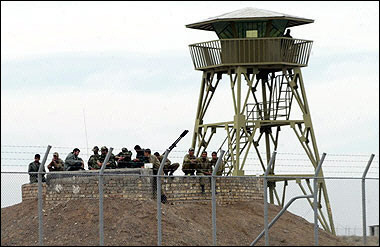Top officials from Britain, China, France, Germany, Russia and the United
States wrapped up more than four hours of talks on the Iranian nuclear crisis
here but failed to agree on a clear strategy to coax Tehran into foregoing
nuclear arms.

Iranian soldiers
gather around an anti-aircraft machinegun inside the uranium enrichment
facility in Natanz, 300 kms south of Tehran. Top officials from Britain,
China, France, Germany, Russia and the United States wrapped up more than
four hours of talks on the Iranian nuclear crisis here but failed to agree
on a clear strategy to coax Tehran into foregoing nuclear arms.
[AFP] |
Participants, however, agreed to continue their discussions, including the
issue of a Franco-British statement now before the UN Security Council that
calls on Iran to comply with the International Atomic Energy Agency (IAEA)
demand that it suspend uranium enrichment.
"The talks were difficult", largely because of Russian and Chinese objections
to the firm stance advocated by the Western powers, said a Western diplomat who
asked not to be named.
The meeting, at Britain's UN mission, brought together US Under Secretary of
State for Political Affairs Nicholas Burns, Russian Deputy Foreign Minister
Sergei Kislyak and foreign ministry political directors John Sawers of Britain,
Stanislas de Laboulaye of France, Zhang Yan of China and Michael Schaefer of
Germany, officials said.
Participants spoke of common ground on the goal of preventing Tehran from
acquiring nuclear weapons but the officials representing the five veto-wielding
members of the UN Security Council plus Germany did not produce concrete plans
to deal with Iran's nuclear defiance.
The meeting had been billed as an attempt by the six powers to map out a
long-term strategy to deal with Tehran.
"We made some progress in looking at the text of the presidential statement
that is before the Security Council," Burns told reporters. "It's clear from
today's meeting that there has to be some more meetings up here in New York."
"We are on the road towards an agreement," he added. "It may take a little
bit of time. But it's going to be be worth the time because when we do achieve a
statement, it will be yet another clear unified message by the international
community."
The Security Council was to resume talks on the revised Franco-British draft
Tuesday amid hopes by Western members that a deal could be sealed later in the
week.
"There was a lot of common ground between us. We share the objective
vis-a-vis Iran and its nuclear program," said Sawers. "It's essential that Iran
takes the steps required in order to start the process of rebuilding confidence
in its nuclear intentions."
But Sawers denied reports from Vienna that Britain had outlined a long-term
strategy that would include an offer to resume talks on European economic
incentives in exchange for Iran renouncing a nuclear weapons capabilities.
"No British government has made such a proposal," he told reporters.
The talks between the so-called EU-3 -- Britain, France and Germany -- and
Iran foundered when Iran started nuclear fuel work last August.
The IAEA has been investigating Iran since February 2003 on US charges that
Tehran is using its civilian nuclear power program to hide an atomic weapons
program.
Schaefer however reiterated that "the Europeans have declared their readiness
to go back into negotiations if Iran freezes its activities and that means all
enrichment-related activities, including what they call the R and D (research
and development) project which de facto is a pilot project in enrichment."
"we have not discussed specifics of resolutions, we have discussed concept,
how to go forward," he added.
Kisliayk described Monday's talks on all aspects of the crisis as
"businesslike" and said more discussions would follow.
Tehran rejects Western charges that it is trying to acquire nuclear weapons
and insists it has a right as a signatory to the nuclear Non-Proliferation Treay
to conduct uranium enrichment.
Western powers see adoption of the Franco-British non-binding statement as
the first step in a graduated response from the Security Council that could
ultimately lead to sanctions against Tehran if it refuses to cooperate.